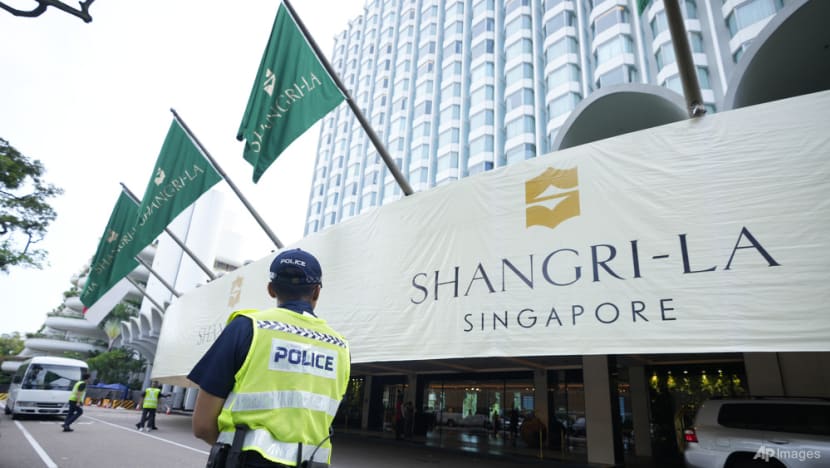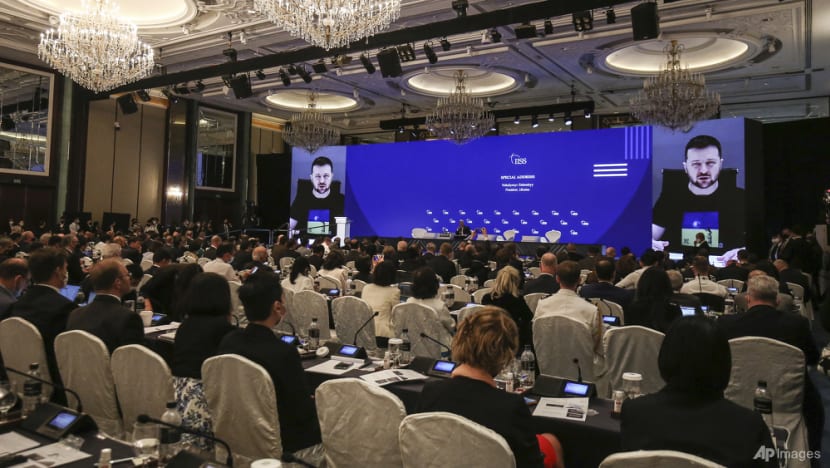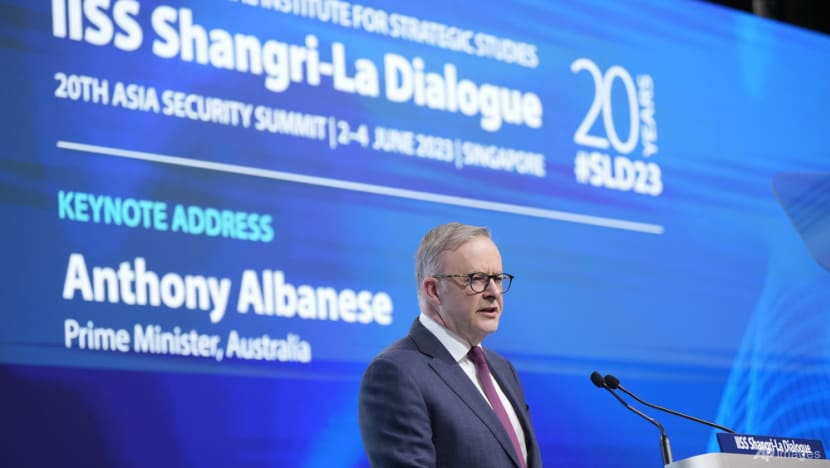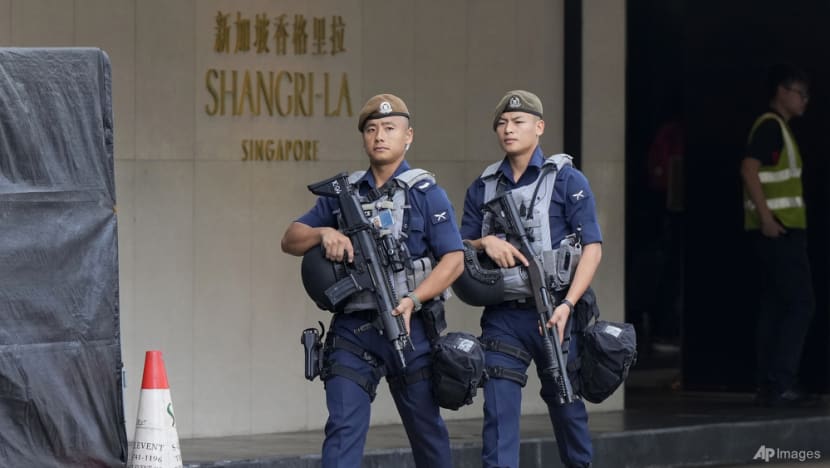CNA Explains: The story behind the Shangri-La Dialogue in Singapore
“This is the first time that we'll probably see a handshake between (US Defense Secretary Lloyd) Austin and (Chinese Defence Minister) Dong Jun,” said one expert on how symbolic plays can create the right atmosphere for further talks.


This audio is generated by an AI tool.
SINGAPORE: Hundreds of delegates from the global security community will gather in Singapore this weekend for the Shangri-La Dialogue, Asia’s premier defence summit.
Now in its 21st edition, the dialogue will take place from Friday (May 31) to Sunday at the Shangri-La Singapore hotel.
How did the Shangri-La Dialogue come about?
The dialogue is a platform for government officials, business leaders, and security experts to discuss pressing regional security concerns. It involves speeches, debates, as well as private meetings on the sidelines.
The forum is held annually by the International Institute for Strategic Studies (IISS).
Dr Lim Tai Wei, adjunct senior research fellow at the National University of Singapore (NUS), said: “As we are increasingly seeing a multipolar world, the Shangri-La Dialogue will play a very important part in gathering many important defence and intelligence officials, as well as foreign diplomatic officials to discuss very important hot-button issues.”

The dialogue started as a huddle of about a dozen defence ministers at the Shangri-La hotel in Singapore in 2002. It came in the wake of global security concerns and terror attacks such as 9/11.
Back then, it was called the Asia Security Conference. Fourteen defence ministers and 160 delegates convened for the dialogue, with the United States sending a delegation led by its deputy defence secretary.
Over the years, the one-and-a-half day summit continued to expand its invitation list and sessions. The forum was later named after the hotel it is typically held in.
In the fifth year of its establishment, high-level officials from China took part in the dialogue. By 2018, nearly 50 countries were represented.
The event was cancelled in 2020 and 2021 due to the COVID-19 pandemic.
Mr Choi Shing Kwok, director and CEO of the ISEAS-Yusof Ishak Institute, said the Shangri-La Dialogue has come a long way.
“It has grown both in terms of the size, and also in terms of the level of stature,” he told CNA’s East Asia Tonight.
“So clearly today, it is the most important defence and security conference for Asia, just as the Munich Security Conference is the one for Europe.”
What does the Shangri-La Dialogue look like now?
Today, the Shangri-La Dialogue spans three days, opening with a closely-watched keynote address made typically by a head of state.
Previous world leaders have used the platform to outline their views on regional and global security challenges, and offer ideas to resolve potential flashpoints. Some have also outlined their country’s position on contentious issues.
Seven plenary sessions on critical and emerging security issues will then follow, featuring defence ministers and senior officials.
There are also six special sessions where policymakers and scholars touch on strategic challenges in the region, from green defence to cybersecurity.
But many of the discussions take place off the stage, with multiple bilateral meetings held on the fringes of the event.

What are the pressing issues?
While the summit’s organisers do not suggest a single overarching theme, several topics have been prominent in recent years, including US-China relations and more recently the ongoing war in Ukraine. The Gaza conflict is expected to be in focus this year.
“The theme has kind of naturally adapted with the changing times, focusing on various topics like terrorism, non-traditional security, (and) tensions in the South China Sea,” said Mr Choi.
“So it has maintained its relevance by adapting to what are the topics of the period.”
Dr Lim from NUS added: “There will be a multitude of talks going on on the sidelines, in the corridors, (and) behind closed doors, so we'll never know what is the full extent of the topics that will be covered in the dialogue.”
For instance, Reuters reported last year that senior officials from the world's major intelligence agencies held a secret meeting on the sidelines of the dialogue. Sources said such meetings have been discreetly held at a separate venue alongside the summit for several years.
Experts noted that with wars and crises piling up, the Shangri-La Dialogue has to prioritise the most urgent issues at the moment.
“There'll quite likely be a kind of a priority order in which the issues are to be tackled, and it also depends on the players involved within the dialogue,” Dr Lim told CNA’s Asia First.
“Different players will have different national agendas and interests, so it really depends on each country's prioritisation of the issues to be brought to the table.”
Will the voices of smaller countries be heard though?
Mr Choi believes smaller nations can leverage the Shangri-La Dialogue to advance their interests, amid tensions among the superpowers that often dominate the agenda.
This year, Philippine President Ferdinand Marcos Jr will be delivering the keynote speech on the opening night of the dialogue. He is likely to reiterate his country's stance on the contested South China Sea, where tensions have been escalating.
“He will certainly have a very good platform to make his views known. So this is one way in which countries that participate can actually get more airtime and also more limelight,” said Mr Choi.
Smaller countries in Southeast Asia also get to air their views at the plenary sessions, he noted.
“I think it's important they continue doing so because they do then make their positions known to the rest of the world, (and) to the global powers,” he added.
“They also present this different perspective. This is, after all, a period when there's great competition and volatility between the great powers.”
Daily Cuts:

Do security forums facilitate dialogue or create division?
High-level security conferences such as the Shangri-La Dialogue can cumulatively contribute to a greater understanding of global issues, stressed Dr Lim.
“There is hardly any detriment in talking and dialoguing, so this dialogue is particularly important as it gathers high-level officials,” he added.
“Just as importantly, corridor diplomacy and closed-door diplomacy will offer the opportunities for great powers to talk to each other. All these are very important sort of contact points and exposures for personal diplomacy to take place.”
For instance, US Defense Secretary Lloyd Austin is expected to meet with his Chinese counterpart Dong Jun at the dialogue this weekend.
It will be the first meeting between the two defence leaders following a phone call in April, which comes as both countries gradually work to mend relations.
“This is the first time that we'll probably see a handshake between secretary Austin and his counterpart, minister Dong,” said Dr Lim. “So this will be seen as a very important symbolic gesture, particularly in a high-context culture in East Asia.”
He noted that symbolic plays are crucial and can create the right atmosphere for further talks to take place.
“In addition, this is an election year in the US. It will also carry symbolic significance for the ongoing political contestation that's going on in the US domestically right now,” Dr Lim added.
On US-China ties, Dr Lim said communication has improved since a highly-anticipated meeting between US President Joe Biden and Chinese President Xi Jinping took place at the Asia-Pacific Economic Cooperation (APEC) summit in San Francisco last November.
“Overall relations have improved, so this is a good time for them to meet,” he added.
“A breakthrough will be very difficult in a public dialogue like this, even for closed-door sessions. But it will create the right atmosphere for people at the field level to be able to carry out the breakthroughs in the day-to-day operations.”
How can the summit stay relevant amid heightened tensions?
This comes as the world is "fragmenting", said Dr Stephen R Nagy, senior associate professor at the International Christian University’s Department of Politics and International Studies.
“We have authoritarian states that really want to weaken international institutions, weaken rule of law, weaken ideas of democracy,” he told CNA938.
“This is not good for smaller states like Singapore. We depend on an international order based on rule of law so that we're not eaten up by big powers.”
Mr Choi from ISEAS–Yusof Ishak Institute noted that the Shangri-La Dialogue has set out to bridge the gap between different sides.
“I think that what the organiser IISS has done from the very beginning is try to be inclusive, and I think that's why they went out and invited China to participate as early as they were comfortable to do so,” he added.
“They have also, I think, quite consciously given China a very prominent speaking slot, so that China would be at the conference and will have enough air time to make its case.”
Despite this, Chinese delegates “may not feel as comfortable” at the Shangri-La Dialogue as compared to other contexts where it may be surrounded by its closer partners, said Mr Choi.
“The style of speaking in the Shangri-La Dialogue is also a little bit more western in nature - in that it is more candid, it's more direct - whereas the Chinese may be used to and may prefer a more sort of diplomatic and very indirect approach and tone.”
Yet Mr Choi believes the security summit in Singapore is still relevant, and “maintains its utility above any other regional forums” as the world gets more volatile and dangerous.















